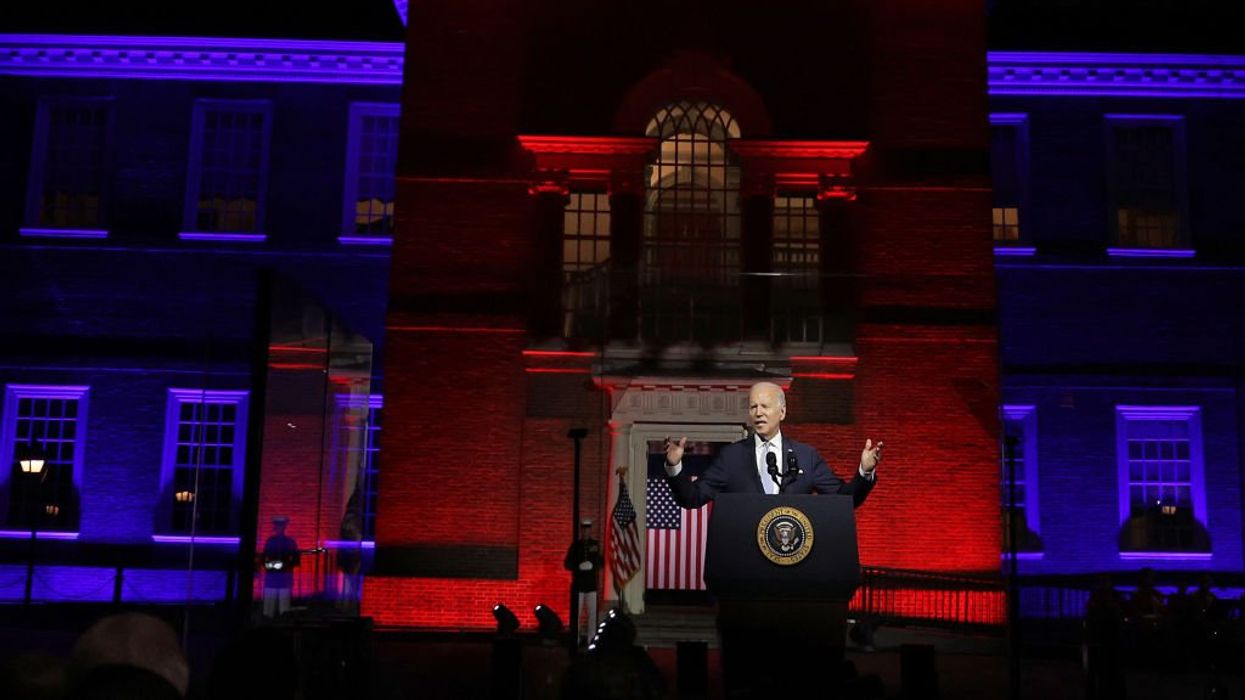
Alex Wong/Getty Images

Judging by the standard of satire, maybe Bing’s accidental political cartoon generator isn’t quite as confused as some would hope.
If a picture is worth a thousand words, a new two-word political cartoon making the rounds on X (formerly Twitter) could explain the entire 2024 election.
The single-panel image was coughed up by Bing’s AI image generator in response to a prompt by George Washington University Illiberalism Studies fellow Julian Waller to depict “democracy vs. authoritarianism.”
“I think it got confused,” a bemused Waller posted along with the pic, which depicts a sunny, thriving cityscape under the banner of AUTHORITARIANISM and a nightmarish, blood-red police state under the banner of DEMOCRACY:
For those with an online politics habit, the hellacious depiction of the “democratic” regime bears an inescapable, if likely unintentional, resemblance to the infamous “anti-authoritarian” speech delivered in September 2022 by Joe Biden. Flanked by Marines and doused in a lurid deep-red glow, the dictatorial-seeming president threw off a theatrically militant vibe that instantly spawned “Dark Brandon” memes persisting to this day:

But it doesn’t take a social media junkie to recognize that the administration’s constant rhetorical drumbeat in the name of “our sacred democracy” has taken on more than an authoritarian sheen.
Under Biden, the administration has pushed a sweeping and unprecedented “whole of government, whole of society” approach to using its control of digital technology to systematize citizen surveillance and suppression of fundamental political speech, up to and including jail time for memes.
There’s no end in sight. And as war after war breaks out around the world, the administration’s incentives grow ever stronger to impose ever more pressure on Americans to perform their loyalty to its regime in accordance with its “democracy vs. authoritarianism” framing.
The perverse approach, applying ever more totalitarian measures for the sake of defending democracy, is reminiscent of little as much as the old saw that the beatings will continue until morale improves.
But is the hypocrisy any surprise, given that authoritarianism is notoriously hard to define and democracy is vague enough a term to include many political pathologies known to Western philosophers for thousands of years?
On the losing end of the double standard, a growing share of commentators on the right, frustrated with the impotence of administration critics calling for fair play, have rallied around a bitter slogan: “It’s not hypocrisy, it’s hierarchy.” The point is that the contemporary left isn’t best understood as inconsistent or unprincipled, but rather as perfectly principled in its commitment to imposing its own power on its own terms over all those who disagree.
Plainly, this line of critique captures something powerful. But it’s important to remember that hypocrisy is much more a spiritual problem — a sin — than hierarchy. Hypocrisy is never justified by one’s power or authority, whereas hierarchy can and should properly reflect the right order of things.
Which puts a finger on the whole problem with the framing of democracy versus authoritarianism today. As America’s founders knew well, mob rule or plebiscitarian populism are recipes for disaster, while hierarchical social and political structures based on a foundation of proper authority are good. Pitting abstract democracy against the authoritarian boogeyman distracts us from the ground truth of political life and encourages us to draw lines of good versus evil in the wrong places.
As a result, we end up where we are now — with regimes labeled “authoritarian” insisting they’re the true voices of democracy and regimes labeled “democracy” engaging in repressive and anti-American conduct wildly authoritarian even by their own vague definition.
Judging by the standard of satire — to lay bare harsh truth through clever exaggeration — maybe Bing’s accidental political cartoon generator isn’t quite as confused as some would hope.
James Poulos
BlazeTV Host